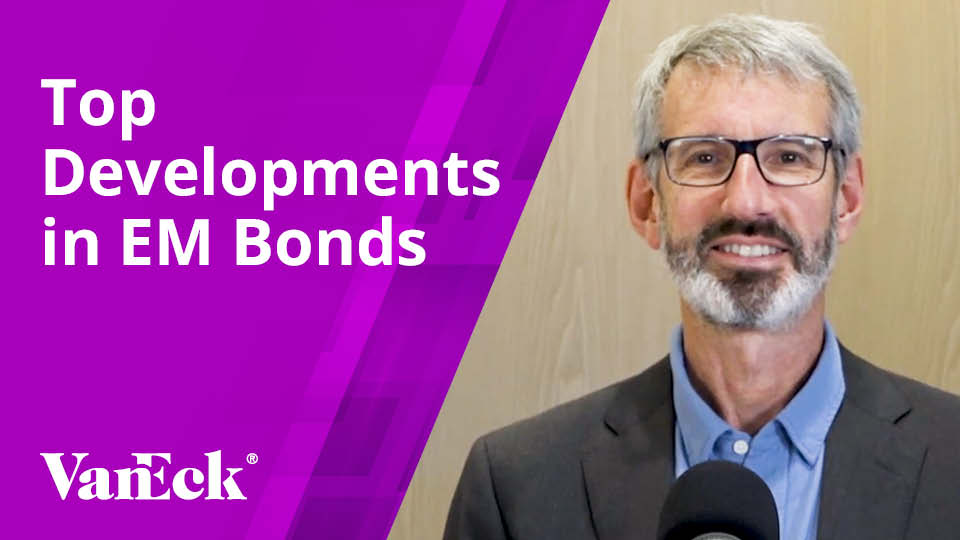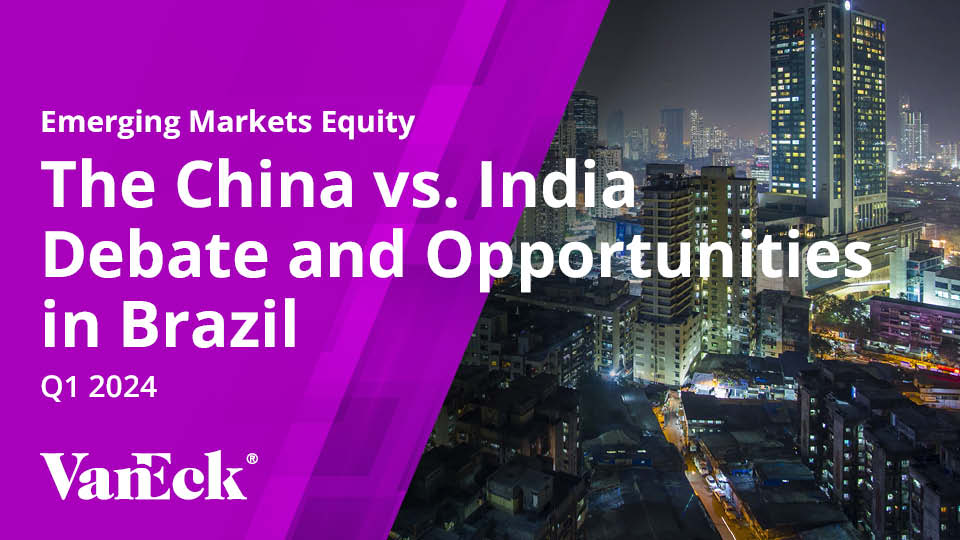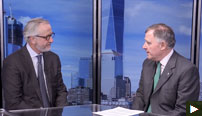Acceleration and Divergence in Emerging Markets Amid COVID-19
06 May 2020
Watch Time 8:15
Jenna Dagenhart: Hello and welcome to Asset TV. This afternoon I'm joined by David Semple. He's the VanEck Emerging Markets Equity Strategies Portfolio Manager. David and the team believe that the growth potential for emerging markets should be viewed with a longer timeframe in mind, beyond the coronavirus and other headlines. Today we'll discuss emerging markets equities and the COVID-19 impact, strategy highlights and investment opportunities in the EM space. David, thanks for being with us.
David Semple: Thank you very much for having me.
Jenna Dagenhart: Yeah, great to have you. So, David, in light of the current pandemic, how has this impacted investing in emerging markets?
David Semple: I think there's a lot of change going on in emerging markets. But I would like to focus on two different things, hang your hat on two different words here. One is acceleration and one is divergence. So, acceleration is important, because on a macro sense, the countries that came into this with issues have seen those issues accelerate and be exacerbated. I think that's very relevant for countries, the likes of Brazil or South Africa, for instance. So, I think that that's one element of it, in a macro sense.
But I think even more interesting, in terms of acceleration, is by sector. I mean, we're all working from home, right? So, we can see what happens in terms of acceleration for telecommuting, acceleration for the use of data centers, for instance. But for us, very relevantly, it's e-commerce and certain parts of e-commerce. It's about cashless societies, for instance. But it's also about things like Chinese pharmaceuticals.
As we develop vaccines, we're becoming, unfortunately, much more nationalistic everywhere. Development of the vaccine is taking place everywhere, but it certainly provides an impetus to the Chinese pharmaceutical sector, which was in any event, an area of a lot of interest to us, including telemedicine as well. I mean, I myself have an appointment with my doctor by video on Monday. And one of our companies we own in China, is one of the largest telemedicine providers in the world.
So you're seeing an acceleration of some of these trends that were already happening, buying stuff online and so forth. But also, a divergence as well—a divergence in terms of how countries deal with this. China obviously first in, first out, increasing control, surveillance on what's going on. And we might not philosophically like that, but it's been very effective, and I think it's hard to deny that. On the other hand, for poorer emerging markets economies, their way of dealing with it, unfortunately, they have a very Hobbesian choice about whether people starve or whether you lockdown or whether you let the virus spread.
The huge advantage for a lot of those countries is there's a very young population. So thankfully, the fatality rate will likely be less. But also, within sectors as well, there's been a big divergence. So, we've long been shareholders—high active share—in the healthcare sector. In [the] healthcare sector, hospitals are struggling a bit, simply because there's not as many elective procedures. Medical tourism is not as viable as borders are closed. On the other hand, as I mentioned, the pharmaceutical side is doing well, and telemedicine is doing well. And also, for consumption. If you distinguish here between social consumption and remote consumption, social consumption is where you have to be with other people to consume—in other words, restaurants, hotels, travel, tourism, casinos, those sorts of things. They are clearly going to take some time to come back. On the other hand, the remote consumption—which is things like e-commerce, things like video games, things like telemedicine, as I talked about earlier—they are clearly benefiting from this.
Jenna Dagenhart: Building off of that, can you give some more examples of companies or industries that are hurt or benefiting from the current market environment?
David Semple: Yeah, we certainly can. We think and talk about this all the time, so there's many, many examples to this. For instance, I talked about telemedicine. One of the holdings that we have is a company called Ping An Good Doctor, listed in Hong Kong. It is I believe the largest telemedicine provider by user base in the world. Now in China, typically you go to hospitals to see doctors, run the family practitioner. Even before this environment, it was not necessarily a pleasant experience because of wait times and the cragginess of a lot of these hospitals. If you can see your medical provider for relatively routine things through a video call on your phone, clearly that's preferable. And the government clearly understands as well that the cost of medical care going forward is something they have to address. Given that doctors in this environment can see many more patients, have many more consultations in a day and much more cost effectively, this has clearly had some tailwinds behind it, which have only accelerated in this case.
Jenna Dagenhart: And finally, how do you see the evolution of the asset class longer term and specifically, what role will China play?
David Semple: Well, it's an interesting question. I've said for a long time that the coherence of emerging markets becomes less valid going forward. In other words, it is a grab bag of countries in many different places. And what we've seen come out of this is an acceleration of nationalism and acceleration, particularly in the U.S., of a narrative about China, which is disapproving. And we'll see increasing balkanization of capital going forward. And that really comes out in terms of, particularly, the tech bifurcation that we're starting to see, where U.S. companies won't deal with Chinese companies, Chinese companies won't deal with U.S. companies, and they develop on their own. We're going to see more of that, more “splinternet,” as they call it.
I think it's going to be harmful, particularly for the smaller, poorer countries, the less educated countries, where they've depended upon cheap labor as their methodology for climbing up the value-added chain. That's going to be less relevant. There's going to be more reshoring. And it certainly tends to advantage those countries that are scale, that are large so-called continental economies, and that have that educational background. It's hard to get away from China here, that China has a lot of these attributes in this respect. Like it or not, in terms of how they run the economy, run the society, it's going to be an increasingly large part of the emerging markets landscape. It's already almost 40% of our benchmark. I can only see that getting bigger.
Jenna Dagenhart: Well, David, thank you so much for your time and your insights. Really great to have you.
David Semple: Thank you very much.
Jenna Dagenhart: And thank you for watching. That was David Semple, the VanEck Emerging Markets Equity Strategies Portfolio Manager. To receive regular updates from VanEck experts, please vaneck.com/subscribe. I'm Jenna Dagenhart with Asset TV.
Related Insights
24 July 2017





